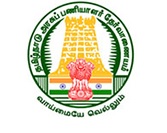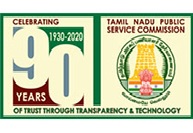TNPSC Pharmaceutical Chemistry Exam Syllabus : Tamil Nadu Public Service Commission
Organisation : Tamil Nadu Public Service Commission (TNPSC)
Exam Name : TNPSC Pharmaceutical Chemistry Examination
Standard : Degree Standard
Subject Code : 245
Announcement : TNPSC Pharmaceutical Chemistry Exam Syllabus
Website : https://www.tnpsc.gov.in/English/new_syllabus.html
TNPSC Pharmaceutical Chemistry Exam Syllabus
TNPSC Pharmaceutical Chemistry Exam Syllabus are given below,
Related / Similar Syllabus : TNPSC Agriculture Exam Syllabus

UNIT I:
1) Atomic structure and valency, Radioactivity, Radio isotopes and Pharmaceutical applications of Radio Pharmaceuticals, hazards and precautions.
2) Sources of impurities in Pharmaceutical substances; Limit test as per I.P; Fundamentals of volumetric Analysis.
3) A systematic study of inorganic compounds for their preparation, assay and use which includes Gastrointestinal agents, Topical agents and Dental products.
UNIT II:
1) Assay, test for purity of sodium, calcium, iron, aluminium and ammonium compounds. Major intracellular and extra cellular electrolytes.
2) Preparation and use of Chemical reagents and Volumetric Solutions as per Pharmacopia in Pharmaceutical Analysis.
3) Theory of Co-ordination Compounds with special reference to application in Pharmaceutical Analysis via EDTA, Dimercaprol, Pencillamine.
UNIT III:
1) Physiochemical properties of gases, liquids and solids. Density, Surface tension, Viscosity and physical properties.
2) Osmosis, osmotic pressure, vapour pressure, Raoult’s law, Ostwalds dilution law, Molecular weight determination by osmotic pressure.
3) Non- aqueous and complexometric titrations, analysis of fats, oils and waxes. Importance of quality control, Different types of titrations, Gasometric analysis and determination of Nitrogen.
UNIT IV:
1) Gases in liquids, liquids in liquids, partially miscible, completely miscible and completely immiscible liquids.
2) Thermochemistry: Heat of reaction, heat of solution, heat of formation and heat of neutralization and Hess law.
3) Stereo chemistry, optical isomerism, Geometrical isomerism.
4) Theory of Polarimetry, Refractometry and catalyst.
UNIT V:
1) Electronic configuration and electron displacement effects, chemical bonds and polarity.
2) Chemistry and medicinal uses of cardiac glycosides and vitamins.
3) Synthetic utility of acetoacetic ester, Grignard reagent and Diazonium compounds.
UNIT VI:
1) Aromaticity,concept of resonance, Nucleophilic, Electrophilic substitution reaction, Elimination reactions in aliphatic and aromatic compounds.
2) Anti-infective agents comprising of Anti-fungal agents, synthetic antibacterial agents, anti-tubercular Agents, and Anthelmintics agents.
UNIT VII:
Chemical structure, Synthesis, assay and therapeutic uses of organic synthetic drugs
like, Antidepressants, General anesthetics, Sedatives and hypnotics, Narcotic
analgesics, Anti – histaminics, Antimalarials., Sulphonamides, Drugs acting on CVS.
UNIT VIII:
1) Structural elucidation of natural products – General methods.
2) Structure, chemistry, methods of estimation, and uses of Alkaloids, Carbohydrates, and Proteins.
3) Chemistry of steroids and natural hormones, currently used steroidal drugs.
UNIT IX:
1) Study of separations and determination involving TLC, HPTLC, and column chromatography.
2) Colorimetry, UV and Visible Spectrophotometry, Spectrofluorimetry- Theory , Principle ,Instrumentation and working.
3) Theory and principles of separation techniques involving Ultra centrifugation, HPLC and Gel filtration.
UNIT X:
1) Conductometry, Potentiometry and Amperometric titrations, Basic concepts and application in pharmaceutical analysis.
2) Radio Immuno Assay and Electrophoresis.
3) Theory, Principle and application of NMR, MS, IR spectroscopy.

Download Syllabus
TNPSC Pharmaceutical Chemistry Exam Syllabus Link:
http://www.syllabus.gen.in/uploads/pdf2022/2971-syllabus.pdf